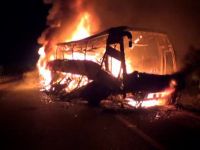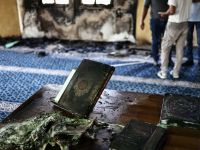UN Security Council envoys Wednesday told East Timorese refugees still sheltering in West Timor that it was safe for them to return home.
"The people we met in East Timor say they want to receive you back," Security Council ambassador Martin Andjaba told a forum with leaders of the Haliwen refugee camp.
The delegation of seven Security Council envoys arrived in Atambua, 25 kilometers (15 miles) from the border with UN-administered East Timor early Wednesday under tight Indonesian military security.
The UN visitors are the first foreign officials to visit the area since three UN High Commissioner for Refugees (UNHCR) workers -- an American, a Croatian and an Ethiopian -- were hacked to death by pro-Jakarta militiamen in Atambua on September 6, prompting the flight of 400 fellow aid workers.
One of the camp leaders, Augustine Pinto, who called himself the leader of the Dili branch of the Union of Timorese Warriors (UNTAS), told Andjaba the people in this camp of 12,000 were not ready to return yet.
UNTAS groups former East Timor militias, blamed for the wave of violence that devastated East Timor and left at least 600 dead after it voted for independence from Indonesia last year.
"We will only go back if we can be guaranteed that we can live peacefully while remaining loyal to Indonesia. We maintain our principles that we are Indonesian patriots," Pinto said.
"We want to go back with the red and white (Indonesian) flag," he said.
The militiamen fled to West Timor in the face of the arrival of an international force sanctioned to halt the violence, and now live among the estimated 130,000 refugees still in squalid camps.
Rights and humanitarian activists have said the militia have since held sway in the refugee camps and continue to intimidate pro-independence East Timor refugees wanting to return home.
"Find out what is going on, because there is security there," British delegation member Stewart Eldon told another camp leader, Antonio do Santos who also refused to believe it was safe for him to return to East Timor.
Maria de Fatima, 35, had another reason to fear returning home.
"My husband is a soldier in the Indonesian military and that is why we feel it is not safe. We are scared of going home," de Fatima said.
Andjaba later criticized the standard of information given to the refugees in the Haliwen camp.
"Better information is needed here to be given to the refugees because when we were in East Timor, this was confirmed and assured to us by East Timorese leaders that there will be security and safety for the refugees when they go back," Andjaba said.
Andjaba also said the West Timor police chief had promised to follow up complaints of intimidation against refugees received by the UN refugee agency.
The seven also visited the site of the grisly September 6 massacre and laid flowers in front of the vandalized office where the slaughtered UN workers were burned.
"The perpetrators of this heinous crime must be brought to justice," Andjaba said.
He has said the mission's priority was to get the refugees out of the camps -- either back home or resettled in other parts of Indonesia.
The delegation is also tasked with monitoring the progress of Indonesia's implementation of a UN Security Council resolution demanding the immediate disarmament and disbandment of the militias, and the prosecution of the killers of the aid workers.
Anjaba has also said the United Nations wanted the UNHCR and all other humanitarian agencies to return to assist the refugees.
West Timor police commander I Gede Mangku Pastika, pledged to do his best "with all efforts, because we understand that without the international humanitarian aid, the problems would go on and on and on."
Andjaba said the team was seeking guarantees from Indonesia that they would ensure conditions to allow aid workers to return in safety and help move the refugees out of the camps where they have been stranded for 14 months.
Jakarta, citing lack of funds, has said it plans to close down the camps soon and is in the process of registering the refugees -- to determine whether they want to return home or settle elsewhere in Indonesia -- ATAMBUA (AFP)
© 2000 Al Bawaba (www.albawaba.com)







